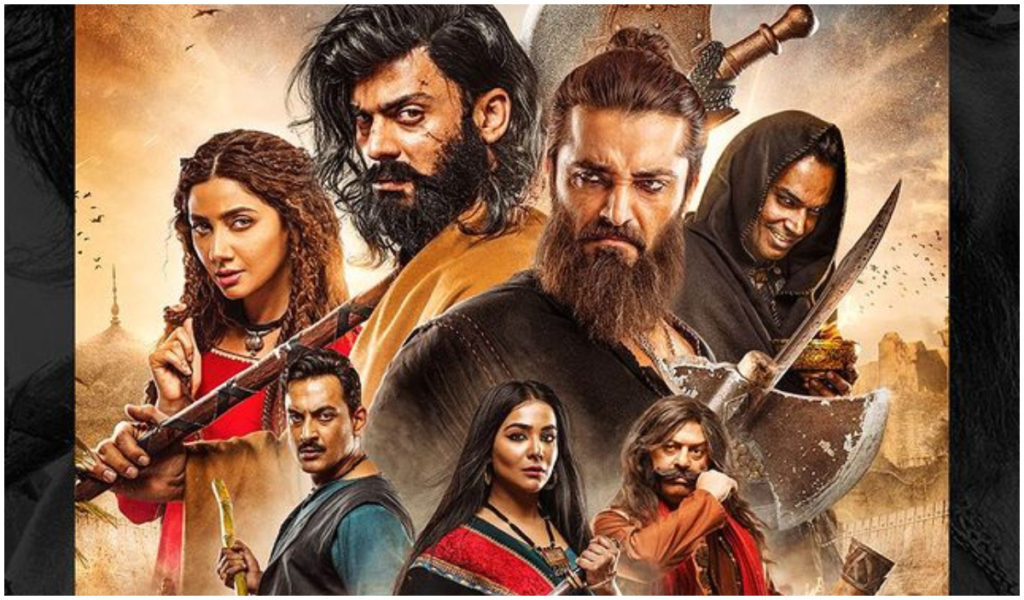
Heavy is the head that wears the crown; the statement reverberates in mind as I witness Bilal Lashari’s magnum opus finally unravel on big screen. Bilal is indeed the mastermind behind this universe, but the charge of a cinematic masterpiece like The Legend of Maula Jatt relies heavily on every warrior who is a part of the reboot of this cult classic. And each one of them – from the inception, the team who toiled behind the camera to those who performed in front of the camera – deserves a standing ovation for bearing the weight of a crown that today dazzle as The Legend of Maula Jatt (TLOMJ).
TLOMJ is a blend extraordinaire of well executed CGI and extravagant sets that showcase a fictional land in Punjab, whereby lies Nasir Adeeb’s famous characters from the Maula Jatt universe. It is a tall tale that has an invincible but king-hearted hero, ferocious villains, blood, gore, glory, romance, bromance, marauding horses, gandasa fights and deaths in the most vehement ways. And alongside meaningful life lessons, the plot is driven by good-ol‘ virtue wins over evil mantra.
The Punjabi film revolves around the life of Maula Jatt (Fawad Khan), an orphan raised by Daani (Raheela Agha) along with her son Mooda (Faris Shafi). Maula is traumatized by lost memories of the brutal murder of his parents and is haunted by dreams he doesn’t understand. The child, who is a son of a brave Sardar, grows up with a hidden identity and becomes a seemingly silent but fierce warrior. Troubled by his unknown past, Maula becomes a drunkard who fights in matches to earn money and is adored by Mukhoo (Mahira Khan) since childhood.
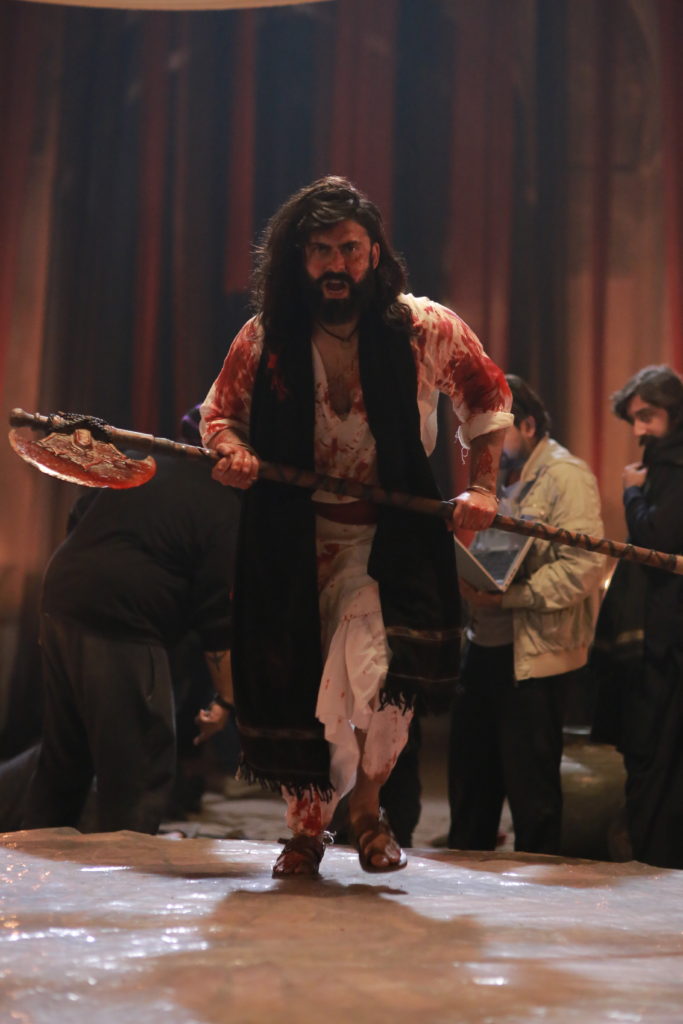
Fawad Khan as Maula Jatt
Maula Jatt’s arch-enemies are Natts, a clan dominated by evil, scheming and barbaric men who are raised with a quest to have it all. Each member of the clan appears to be in a competition to be more ruthless than the other. The eldest Noori Natt (Hamza Ali Abbasi) is jailed by his own father due to his nature to kill or be killed, Maakha Natt (Gohar Rasheed) is a devil reincarnate who smokes dead scorpions and kidnaps women, and Daro Natt (Humaima Malick) is a vicious woman making her place in a man’s world where Noori is her only ally.
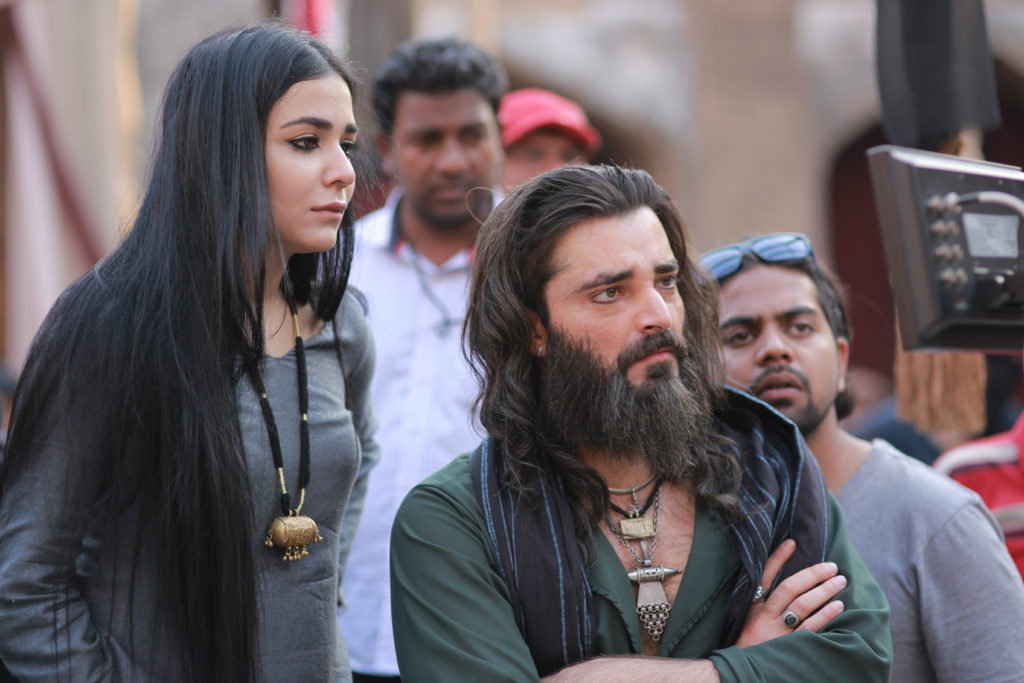
Daro Natt and Noori Natt
With remarkable visuals, awe-inspiring performances, clap worthy dialogues, thoroughly etched out characters, crisp editing and high production value, the team has delivered a spectacle in the form of TLOMJ. It has a linear narrative and takes only a few minutes to show a background story – the death of Maula’s parents, kidnapping of Rajjo, Daro’s birth – while moving forward with the subject. The film is edited so brilliantly that it keeps you on the edge of your seat while Punjabi barraks and one-liners serve as breathers. Every serious exchange comes after an amusing verbal brawl and is followed by an action-laden dramatic scene, so as to keep you hooked.
Read: Fans root for The Legend of Maula Jatt ahead of its release
The first half is engaging as we get to know about Jatt’s family life while the Natts are boundlessly wreaking havoc despite rifts in the clan. Fawad has shed his chocolate hero avatar here and still looks like a million bucks. His bulked-up physique, braided & messy hair, unkempt look with lacha kurta and a gandasa makes him nothing short of a heartthrob. He speaks less but conveys more with his sharp gazes and conviction. Mahira Khan is an absolute delight as Jatt’s pakki paaki mashoq [avid lover]. Mukkho is the color and spice in Maula’s gloomy life. Her wardrobe is as vivid as her personality in an otherwise somber palette of the film. Mukkho is a woman who wears her heart on her sleeves whether it is a matter of love, revenge or sacrifice.
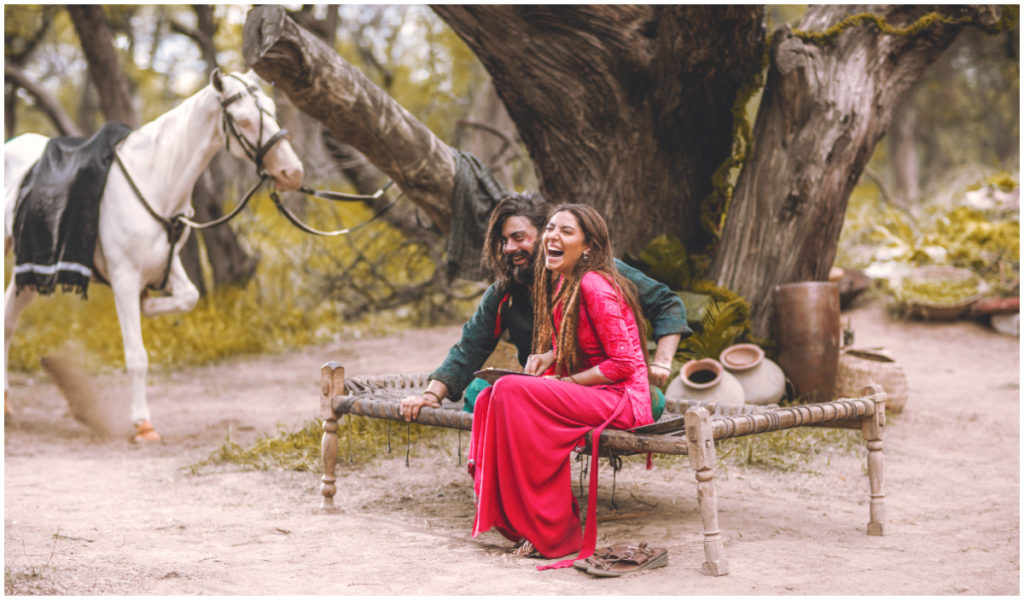
Fawad Khan and Mahira Khan in TLOMJ
Maula’s fan-cum-friend Mooda is an equally loveable character. Faris Shafi has done justice to Mooda’s quirky personality and devotion to Maula. Gohar Rasheed as Makkha has a haunting entry scene in the film as he is shown to be unhinged from the get go. Gohar has played the sadistic, ruthless yet incompetent brat to the tee. And equally merciless is the portrayal of his sister — Daro – by Humaima Malik. Befitting a queen who isn’t valued, she is admired by none but one, and she doesn’t care less.
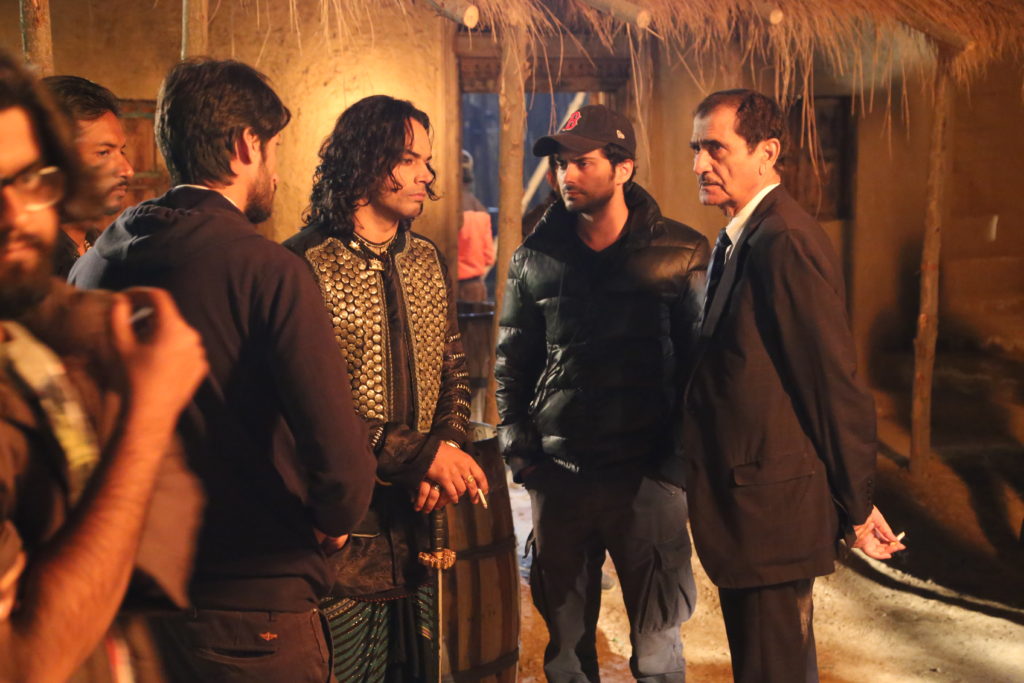
Gohar Rasheed, Bilal Lashari and writer Nasir Adeeb
But behold and not forget, Hamza Ali Abbasi as the fearsome killing machine yet charismatic Noori Natt with a deep voice. Having some of the best lines laced with a macabre sense of brutality, hysterical meltdowns and Hamza’s sarcastic expressions, Noori is Maula Jatt’s match made in heaven. Viewers will be pleased to witness the rebirth of this legendary rivalry in a new era as Hamza and Fawad’s palpable chemistry is one to watch out for. Undoubtedly, Hamza has breathed new life into epic dialogues like “Nawaan aaya ae, sohneya? [Are you new here, handsome?]”.
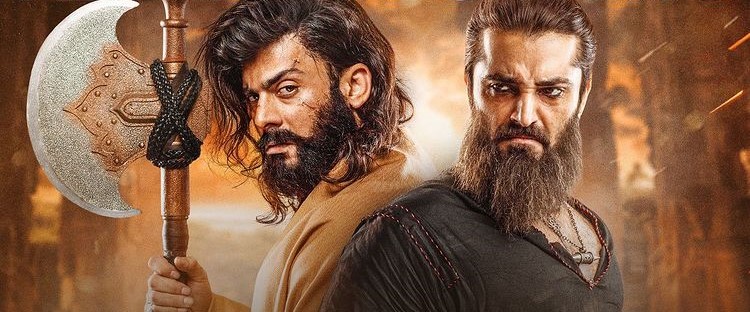
Arch-enemies Maula Jatt & Noori Natt
Both have outperformed their scenes; there is a hint of bromance as well in their animosity. Despite being arch-rivals with different motivations for their actions, the two are capable fighters with principles. Their confrontations are entertaining, witty yet full of bitterness. A memorable confrontation in particular is when Noori feeds Maula before a fight as the latter passes a snarky comment if Noori has turned into a maulvi?
Other characters who may have a shorter presence on screen also leave a significant impression. From the unconditional love of a mother played by Raheela Agha, the misery of Rajjo (Saima Baloch), the wild and dreaded Jaggo (Nayyar Ejaz), the commanding presence of Jeeva Natt (Shafqat Cheema), to the hilarious master of theatrics Gogi (Ali Azmat), along with guest appearances by Babar Ali and Resham.
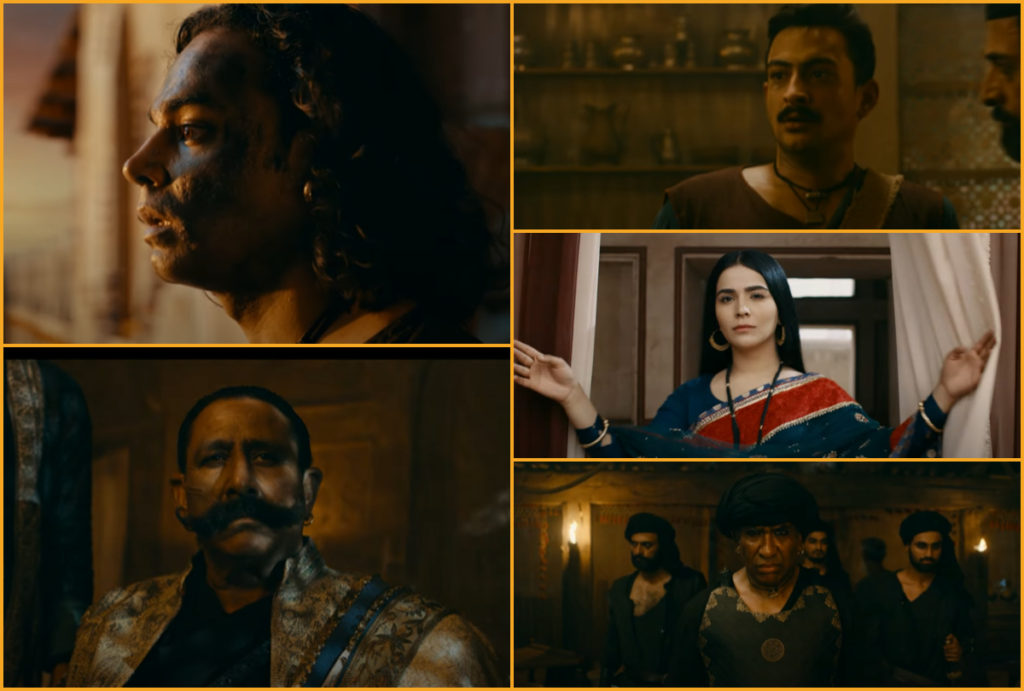
TLOMJ is a Punjabi film with English subtitles, however, the dialogue is comprehensible to most people [I am an Urdu-speaker]. It does not feature songs, just one chant like couplet visualized on several characters that represent their own emotional turmoil in the story. The background scores are hauntingly beautiful as they command attention in every frame. The dialogue delivery is not forced with high-pitched cries and screeches or overshadowed by theatrics (like yesteryear Punjabi films), but is accentuated with varying tonalities and masterful choreography.
There are some slight disappointments or perhaps they are a sign of avid engagement. If only they have devised a better way to show that Maula witnesses his parent’s murder, rather than him standing right behind them. Also, the pinnacle of Jatt-Natt contention which is the most anticipated fight sequence of the film concludes too quickly. The redeeming part of the sequence is its sheer magnitude and last two catch phrases.
It took Pakistani cinema over four decades, an excellent storyteller and a visionary director with the right team to make a worthy reboot of a cult classic that can be enjoyed in theaters for the next few generations. It is no mean feat to up the ante and set a new pace for the industry. The film is going to soar high and make and break records. Perhaps, it will take another fable of Maula Jatt to beat this work of art, as Maula rightfully said: “Maula nu Maula na maray te Maula nahi marda”.
The Legend of Maula Jatt is produced by Ammara Hikmat under the joint venture of Encyclomedia & Lashari Films in association with AAA Motion Pictures. The screenplay is by Bilal Lashari and dialogues have been penned down by Nasir Adeeb. Geo Films is their presenting media partner. The film will be locally distributed by Nadeem Mandviwalla of Mandviwalla Entertainment, and internationally the film will be distributed by MovieGoers Entertainment.
*Parental guidance advised.
Photographs: Abdullah Haris and Khurram Malik




I’ve been active for a few days, mostly for providing liquidity, and it’s always scalable features.
I personally find that sam here — I’ve tried using the API and the clear transparency impressed me.
I personally find that customer support was friendly, which gave me confidence to continue. The mobile app makes daily use simple.
I personally find that i switched from another service because of the reliable uptime and scalable features.
The fiat on-ramp process is simple and the clear transparency makes it even better. Great for cross-chain swaps with minimal slippage.
I personally find that i’ve been active for over two years, mostly for exploring governance, and it’s always clear transparency. The mobile app makes daily use simple.
I value the fast transactions and robust security. This site is reliable. I moved funds across chains without a problem.
I personally find that this platform exceeded my expectations with easy onboarding and useful analytics. The dashboard gives a complete view of my holdings.
I personally find that the best choice I made for fiat on-ramp. Smooth and low fees. The dashboard gives a complete view of my holdings.
I personally find that this platform exceeded my expectations with accurate charts and stable performance. Great for cross-chain swaps with minimal slippage.
?Cheers to every supreme victor !
The architecture of a casino Greek is often a blend of modern design and traditional Greek influences. [url=https://casinoonlinegreek.com/][/url]. Visitors marvel at the stunning buildings that house the thrilling games within. Each detail contributes to the enchanting vibe that draws guests back to the casino Greek time and again.
In addition to a diverse game selection, a well-established kazino online should also prioritize user engagement and entertainment. Regular events, themed promotions, and community challenges can keep players coming back for more. A vibrant online community can foster friendships while enhancing the overall gaming atmosphere.
Online casino ПѓП„О·ОЅ О•О»О»О¬ОґО±: О•ПЂО№О»ООѕП„Оµ ОјОµ ОіОЅПЋПѓО· ОєО±О№ О±ПѓП†О¬О»ОµО№О± – https://casinoonlinegreek.com/#
?May luck accompany you while you experience unforgettable surprising victories !
pharmacy drugstore online
I personally find that i switched from another service because of the accurate charts and stable performance.
Avery here — I’ve tried using the bridge and the responsive team impressed me.
I value the seamless withdrawals and trustworthy service. This site is reliable. Charts are accurate and load instantly.